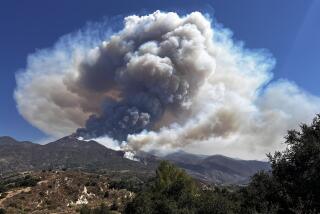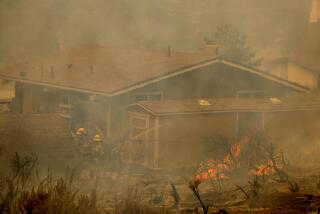A political lesson from the fire lines
Fire exploded last week across Southern California, from the apple orchards of Oak Glen to the enclaves of Tujunga. As fire does, it ravaged acreage -- more than 154,000 acres in Los Angeles County alone by early Saturday -- and lives. Two firefighters died. Others were injured. Dozens of residents found their homes turned to ash. And if autumn’s history is any guide, last week was a siren warning of things to come.
The least of the lessons to be gained from this fire may have been the political ones. But they were there, nonetheless.
Among them is the fact that, even as they and their fellow government workers take it on the chin via cutbacks, firefighters are still among the most venerated among us, by the citizenry itself and by politicians who crave their embrace.
“I want to say again thank you, thank you, thank you to our fantastic California firefighters that are the toughest firefighters, the most experienced, best-trained, best-equipped firefighters in the world,” Gov. Arnold Schwarzenegger said last Sunday in Lake View Terrace. “So we want to thank them and give them a big hand right now for the great, great work that they are doing.” He would repeat the sentiments over and over through the week in different locales, almost always standing out in a blinding white shirt against the smoke-stained denizens around him.
And there is this too: Even in this season of political discontent, when healthcare town halls across the nation resound with demands that government stay out of people’s lives, a strikingly opposite view dominates among those watching flames lick toward their homes.
There, the call was not for less government action but for more: more firefighters, more helicopters, more Super Scoopers.
It raised a question: If the government can be trusted to protect your house, why not your health?
The comparison, to some, is apples and oranges. Protection from fire is a long-standing government responsibility; protection from illness has long been a private one.
But it was not always so. Until a century or so ago, fire protection operated much as the current health insurance system does: Pay the premiums to the insurance companies, get the protection from them. There were volunteer fire organizations as well, as there still are across California and the country.
The city of Los Angeles was founded in 1781 and incorporated in 1850. Its Fire Department wasn’t founded until 1886. The county’s department, similarly, was established decades after the county came into existence.
In a historic turn not lost on those fighting over healthcare, fire departments became civic responsibilities when the communal risk demanded a communal solution. A similar shift took place in education, which initially was limited to private schools.
Now, “there’s no area more than public safety that people feel is the proper province of government,” said Rep. Adam B. Schiff, a Democrat whose district included some of the fire-endangered areas and who, like other members of Congress, has been besieged this summer over healthcare.
“I think people recognize they are not going to be able to have a completely volunteer force to protect against fires or prevent against crime.
“On healthcare,” he added, “it’s more mixed. People who have private insurance, and are happy with the private insurance they have, are happy to leave it in the private realm and let others fend for themselves. . . . It all turns on what people’s experiences have been.”
Before Social Security came into being, he noted, voters didn’t see a government role in retirement. But now the system is so much a political bulwark that it is practically unassailable.
There are, of course, key differences between firefighting and healthcare. First, as Rep. Brad Sherman, a Democrat from Sherman Oaks, pointed out, people see their health as a more personal concern.
“Fires have a tendency to spread from one home to another, and this should be a private good,” he said, describing the mind-set that led to government-run fire services. “In contrast, while disease does go from one person to another, the tendency is to think that medical care is only for the benefit of the patient.” Or, as he put it, “I’m not going to catch your cholesterol.”
Additionally, the shift from private to public fire departments occurred before private fire operators could become the insurance behemoths of today -- capable, depending on one’s political perspective, either of providing the needed services or blocking needed change.
“What you didn’t have when the fire services were developing was an already mature and well-financed firefighting industry,” said Carroll Wills, a spokesman for California Professional Firefighters, which represents 30,000 federal, state and local firefighters. “As a practical matter, you have a much different situation on the ground now.”
That is precisely why government intervention -- at least in the form of a public insurance option -- is not necessary, according to Rep. David Dreier, a Republican from San Dimas who, like Schiff and Sherman, joined the governor at fire hot spots last week. As he put it, voters have come to expect firefighting to be handled by the government, but private options make that unnecessary for healthcare.
“There’s not a private alternative; it is a government service,” Dreier said of firefighting. “It is something that they’ve grown accustomed to. When it comes to healthcare, people have private insurance. By and large, if people thought they could have fire safety and security, all of them privately, I think were it not for this century of experience instinctively they would be for it.”
“The point is that people have seen the benefits of private healthcare insurance,” he said, “not that there aren’t problems.”
Each Sunday, The Week examines implications of major stories. It is archived at latimes.com/theweek.
More to Read
Sign up for Essential California
The most important California stories and recommendations in your inbox every morning.
You may occasionally receive promotional content from the Los Angeles Times.











